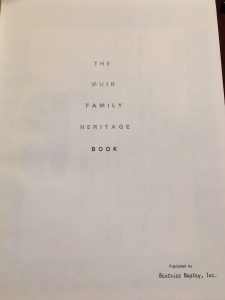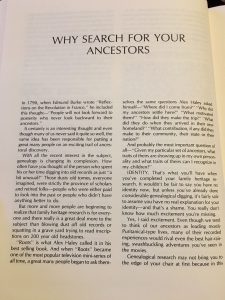 In a previous post, I mentioned that my mother had received several pictures and other items that belonged to my grandparents. In addition to the certificate that belonged to my great-grandfather, which I mentioned in my last blog post, I came across a book entitled The Muir Family Heritage Book.
In a previous post, I mentioned that my mother had received several pictures and other items that belonged to my grandparents. In addition to the certificate that belonged to my great-grandfather, which I mentioned in my last blog post, I came across a book entitled The Muir Family Heritage Book.
According to one of the first pages of the book, The Muir Family Heritage Book was purchased by my grandfather in 1984. This surprised me; my mother had told me stories of her grandparents (my great-parents), but didn’t seem to know much about her family beyond them, and none of my aunts and uncles appeared to have an outward interest in genealogy.
Opening the book, I expected to find a genealogy of the Muir family. Instead, the book was more of a general guide for family history. It included information on ethnic origins, heraldry, and why to research your ancestors. In fact, the only information actually pertaining to the Muir surname was in a list of Muir households across the country. It wasn’t exactly a wealth of information on the Muirs.
 For what it was worth, this Muir Family Heritage Book did have some really helpful genealogy forms and charts, including a 5 Generation Family Chart, and a sample letter that individuals could copy in order to contact local historical societies. However, this book was still more of a genealogy guide than an actual book on a particular family’s history.
For what it was worth, this Muir Family Heritage Book did have some really helpful genealogy forms and charts, including a 5 Generation Family Chart, and a sample letter that individuals could copy in order to contact local historical societies. However, this book was still more of a genealogy guide than an actual book on a particular family’s history.
Wondering if this type of book was once popular, I began researching the publisher, Beatrice Bayley, Inc. Though various online retailers were full of similar “family heritage books” printed by the publisher, I could find very little about the history of the publication and whether it still exists today. I was, however, able to locate two news articles from the 1980s that painted Beatrice Bayley, Inc. in a less than flattering light.
The Christian Science Monitor published an article with the title “Heritage books – some love ‘em, others feel cheated,” which discussed the same criticisms I found in the book; many of those who purchased the books noted that it could be found in any local library, and that the description as a heritage book was misleading.[1] A 1985 Washington Post article, “‘Heritage’ Book Scrutiny” stated that the publishing company was investigated for mail fraud in 1980, and a case against the company was again examined in 1985.[2]
According to the Washington Post, the publishing company sent out over 400,000 postcards each week to families across the country, advertising “‘invaluable guide’ that ‘will lead you through the discovery and documentation of your personal and family heritage.’” Advertisements sent out to households advertised a unique family book; however, the Better Business Bureau indicated in a January 1985 report that “the book is personalized only to the extent of being titled with the purchaser’s family surname.”[3]
I wonder if my grandfather was expecting something different and more personalized than The Muir Family Heritage book when he purchased it in 1984. Was he disappointed by what he received in the mail, or did he appreciate some of the genealogical charts as a potential starting-off point in researching his family? Unfortunately, with a lack of writing in the book, indicating its use as a workbook, I think he may have been a disappointed customer, too.
Notes
[1] Cheryl C. Sullivan, “Heritage books – some love ‘em, others feel cheated,” The Christian Science Monitor, 28 July 1983. Accessed 23 March 2017, http://www.csmonitor.com/1983/0728/072843.html.
[2] Molly Sinclair, “‘Heritage’ Book Scrutiny,” The Washington Post, 4 May 1985. Accessed 23 March 2017, https://www.washingtonpost.com/archive/local/1985/05/04/heritage-book-scrutiny/aa459724-16ec-4a37-b6bf-2cc930ca347a/?utm_term=.96fc234b22b3.
[3] Ibid.
Share this:
About Katrina Fahy
Katrina, a native of Dedham, Massachusetts, earned a B.A. in History and Art History from St. Anselm College. Previously, she interned at the New Hampshire Historical Society, constructing biographies of New Hampshire quilt makers as well as transcribing a mid-nineteenth century New Hampshire diary and creating an educational program based on its contents. Katrina's research interests include New England and South East regions, as well as the American Revolution.View all posts by Katrina Fahy →